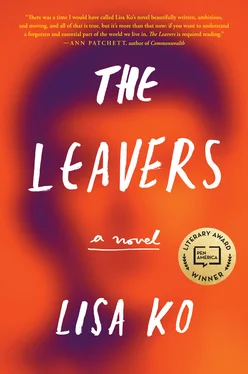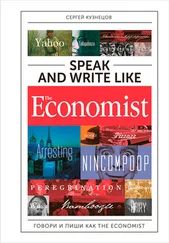I didn’t think it would be that easy, but we had to try something. It was better to participate than to acknowledge we had no options.
Lei refused to be a part of it.
After lunch, the guards unlocked the door to the yard and we walked outside. After a few minutes we began to move around, changing from bunches to lines and corners. We spelled out letters. H-E-L-P. So that the news helicopters could see us from above.
I stepped behind Samara, rolling my sleeves up in the heat.
“Your skin is broken,” Samara said. “It looks painful.”
I pulled my sleeves back down. “It’s nothing,” I said.
We stood for a long time, waiting for something to happen, for the church people, the journalists. But nothing happened except the guards got angry, yelling at us to go in. Lei and the other women on the opposite side of the yard returned to the tent. Samara and I stayed standing. The sky remained blue and still. There were no birds in the desert, no cars driving on a nearby highway, no cool ocean lapping my ankles, only hot sky. Then I heard it, a buzz slicing the air. The buzz grew louder and I saw a shape circling the clouds, a blue dot no larger than a bird, and the bird grew bigger and the buzz was thundering.
But when the plane flew away the silence was monstrous. “We haven’t figured out what to do after this,” I said to Samara.
Guards with helmets and plastic shields pushed into the yard, and as the air filled with burning, my eyes seared and my tongue became bitter. I could only see clouds and helmeted men. I felt a stick in the side and hit the ground hip first.
THE LENGTH OF MY new room was eleven footprints up and eight across. All those months in the tent waiting in line for the toilets and now I could spend a week sitting on a toilet by myself. There was a mattress on a concrete shelf, a chair shaped from a concrete block, and a little light that was forever on.
Three times a day, the steel door on the front wall would open and a tray would push through the slot like a tongue protruding out a mouth. I am breakfast, I imagined the mouth saying. Hello, I’m lunch! The tray contained a brown slab. Breakfast or lunch, a slab. Dinner a slab. It tasted like mush. I talked to the mouth as I shoved the empty trays back. Do you how like that feels, Big Mouth? You like it. You love it.
Three times a week the guards would thread a chain around my ankle, another around my waist. Three hours a week I was allowed outside, in a cage inside a yard surrounded by tall walls, my legs and arms sore from not moving, my eyes sore at having to focus so far, unused to seeing anything farther than eleven footprints up and eight across. Sometimes I’d see traces of others. Was that shape Mary? Samara? But I never saw anyone close enough to be sure.
Against my will I’d think of your smile ripping open as we rode the subway, of the words that had dripped and skipped so easily on Polly’s tongue, delivered without having to strain or translate. I thought of Peilan kissing Haifeng, how Peilan’s body had been so new that she would catch a glimpse of herself in a window and think, Yeah, that’s me . When Peilan was supposed to be doing the wash she would brush her hair for hours until it shone, linger outside so her hair could catch the light and drink it in.
The walls were a lie, a trick. I could pull them apart with my hands, gentle and determined, like pulling a shirt over a child’s head, blow on the floor until it fell away and then I would be in the grass, sunshine rolling up my body, lapping at my fingers. The sun would have a tongue, nice and fat, licking slow and lazy, and the grass would smell like worms and dirt. My body would pick up speed as I rolled, bouncing into the air, soaring over hills and oceans. There was my house, Yi Ba in the yard with chickens. I’d arch up, kick my legs, and coast.
Because I wasn’t really here. This was the life of another person I was watching in a movie, saying, What a pity, oh that poor woman, oh I’m so glad that isn’t me .
I pushed at the walls with my head. I’d crack them open so I could return to you. Keep you with me.
THEY BANDAGED MY SKULL, clucking at my head and scratched-up arms, and for days it felt like my brain was sprouting nails.
IN A ROOM WITH long rows of chairs and tables, I listened to a young man in a suit talk through wire mesh, his collar damp with sweat, his words muffled through the grating. I couldn’t tell what language he was speaking. The last person I had spoken to was a guard, the person before that a guard. The man in the suit said lawyer in Mandarin. As he spoke he gestured with his hands and I imagined them wrapped around my neck and I screamed.
I DON’T KNOW HOW many days later, I was in a van as it moved down a highway, and my eyes watered at the sudden sunlight. Then I was in a room with windows, the space so long I could sense myself falling. One by one, men in blue pants and shirts walked to the front of the room to speak to an older man who introduced himself as the judge. When it was my turn, the judge spoke to me, but he talked so fast, I couldn’t tell what he was saying.
A white woman was next to me in a brown suit, waiting for a reply. I dredged up one word and turned to the woman: why?
The judge slammed his hand on the podium. You don’t. Talk.
“What is your name?” the judge asked in English.
“Guo Peilan,” I said. “Polly Guo.”
He slammed his hand down again. The woman in the suit spoke in Mandarin. “You need to wait for my translation.”
“What is your name?” asked the judge again, and again I answered before the woman had spoken.
“You need to wait for my translation,” the woman repeated. “You can’t answer his question until I translate it.”
“But what am I doing here?”
“They want to deport you, but they need to get the right documents first.”
“They can’t do that. Where’s my lawyer? I have a son here, he’s an American citizen.”
The judge said something I couldn’t hear.
“Dismissed,” the woman said. “You spoke out of turn. He’s going to issue an order of deportation that says you didn’t show up today because you spoke out of turn.”
“But I showed up!”
The ride back to Ardsleyville was hot and shaky. A man in an officer’s uniform asked me to mark a paper printed with English words. I wrote my name on the line.
Back in my room, the walls dissolved and I stepped outside. I was becoming someone else again.
I REMEMBERED A SOLITARY light blinking on the tip of the plane’s wing, the man in the next seat jiggling his knees like he was about to jump out of his pants. It was night. I shivered, sweating, couldn’t remember the last time I’d eaten, and then I leaned over and vomited on my shoes.
Two uniformed men ushered me off the plane with a twenty-yuan bill and a newly issued ID. There were people around me speaking in Mandarin, Fuzhounese.
“Where are we?” I asked one of the men in Mandarin.
“Fuzhou. Changle.”
“There’s no airport in Changle.”
“There is now.”
I found a door and pushed it open. I stood on the curb, nauseous, as mopeds and cars roared around me, the noise deafening, thunderous, and as I took a step forward a moped zoomed past, nearly knocking me over. The uniformed men had said I could go, but where? There could still be guards watching.
It was a cloudy morning in November, or January, and the air was packed with smells I recognized, memories of the village: burning wood and paper ashes, roast meat and salt, a brackish odor, swampy and thick with a tinge of rot. The scent of the riverbank. Was this was for real, or was it a trick? I needed to find you.
Читать дальше











